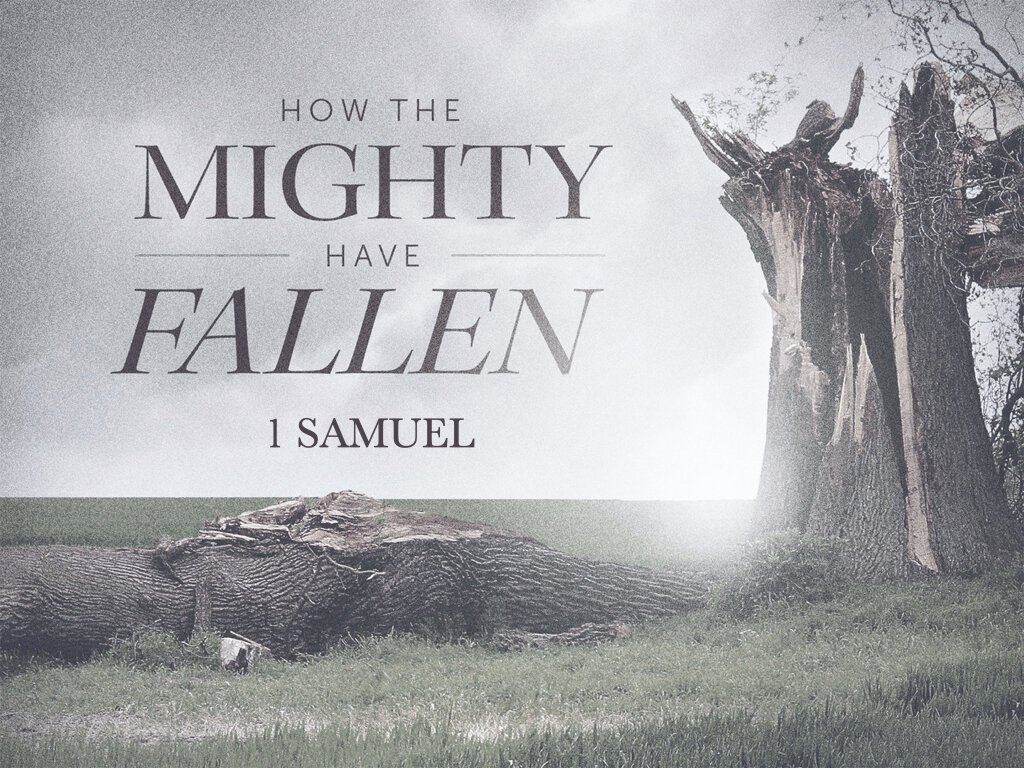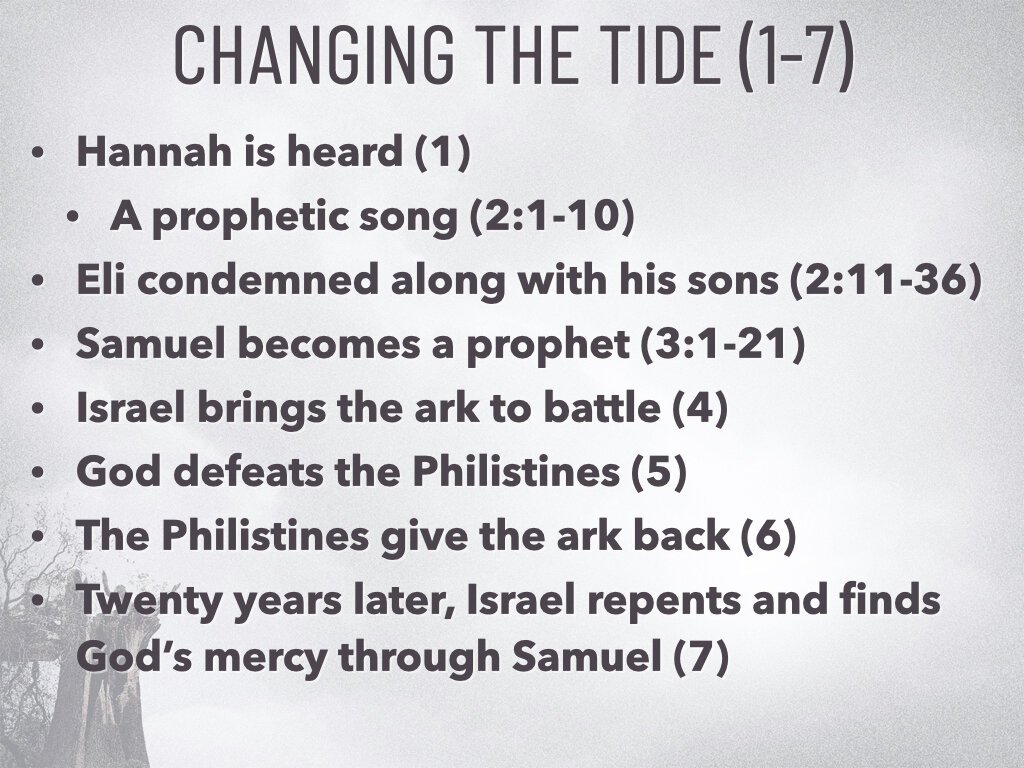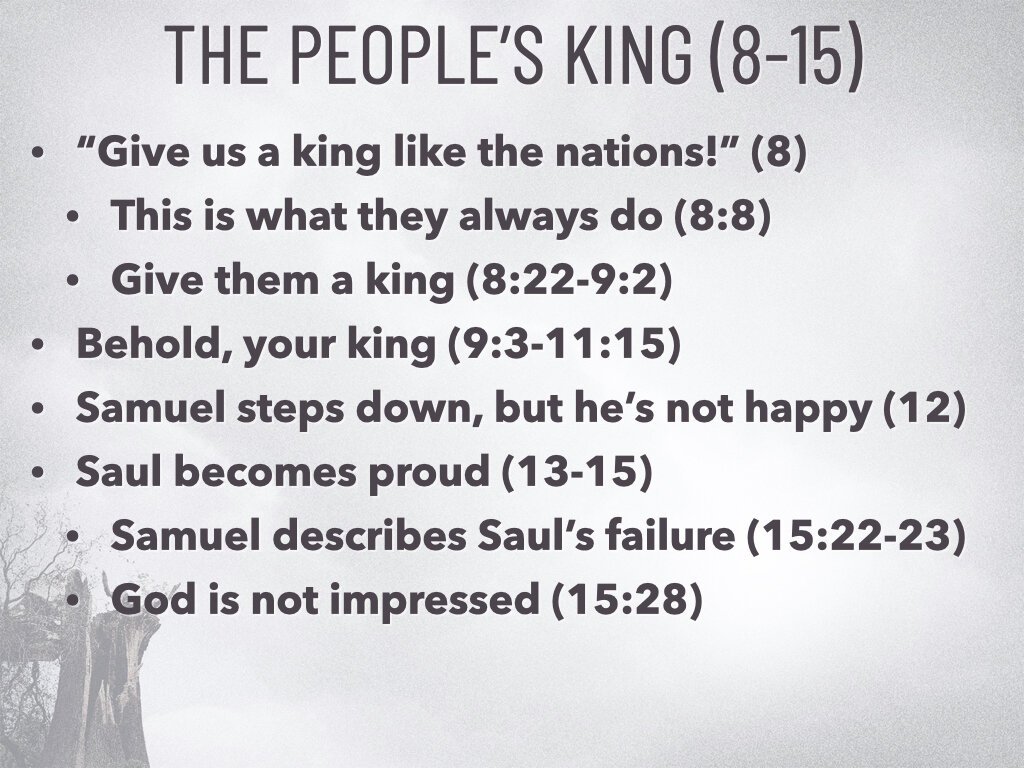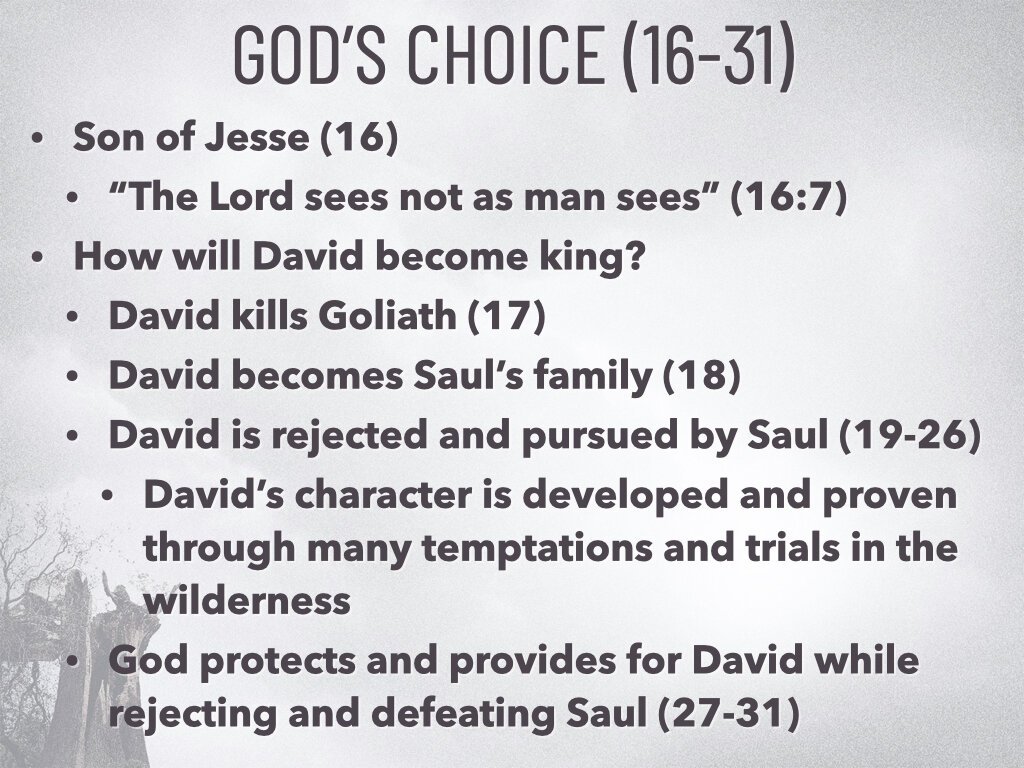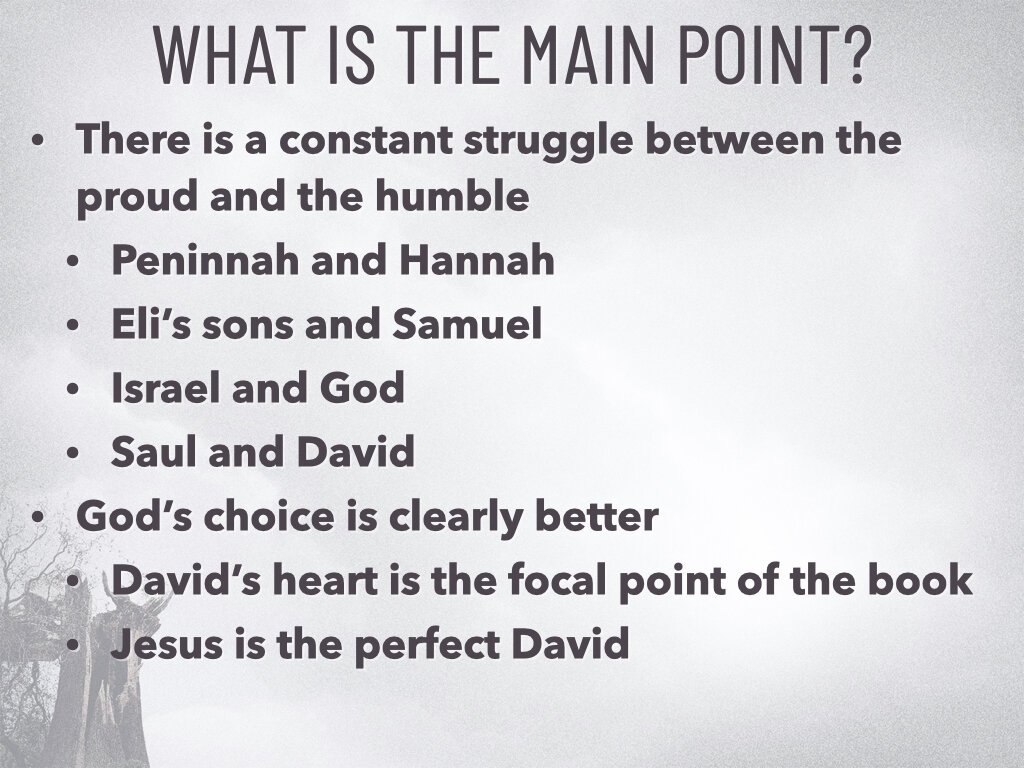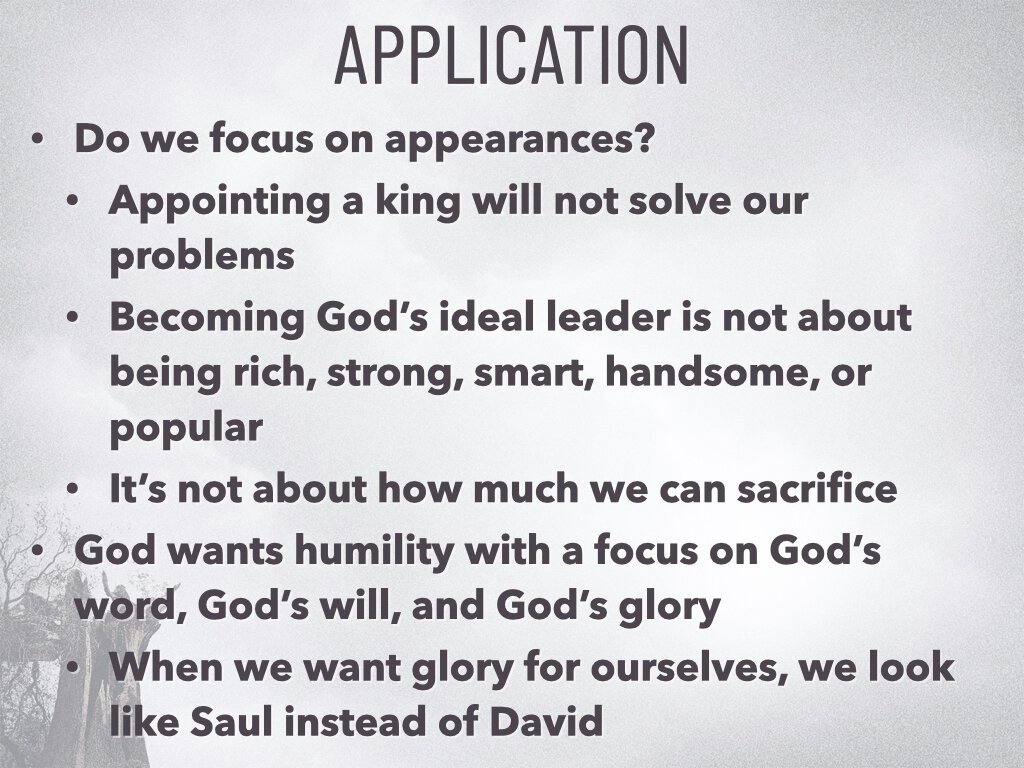The Mighty Have Fallen (1 Samuel)
July 5, 2020
The book of 1 Samuel is the beginning of a two-part series known as Samuel. Together, these books take us from the leadership of judges to a kingdom led by a king. If you were to look at this book from a big picture perspective, you would see that it is broken up into three sections. First, in chapters 1-8, we see the rise of the last great judge and the first great prophet Samuel. Samuel is a man who leads the people back to God and tries to help them stay on the right track when they want to rebel against God by asking for a king. Chapters 9-15 are about Saul, the first king of Israel. Then, chapters 16-31 are about Saul and David. These chapters bring out the message of the entire book. We are going to constrain ourselves to the first book of Samuel, but the story will continue next week as we go through the second book.
The Story
Samuel (1-3)
In the first chapter, the story begins with a familiar scene. A man has two wives, and one of them is barren. This reminds us of Abraham and Jacob. The woman with children is provoking the woman without children and making her upset. This leads to Hannah, the barren woman going to the temple and seeking God's help. Eli, the priest/judge at the time, condemns her for being drunk, but then he blesses her when he finds out what is going on. When she hears this news, she wholeheartedly believes the words of Eli. She has a total unwavering faith that God will give her a child. He does give her a child. Hannah ends up having a son named Samuel. She takes him after he is weaned and gives him to the Lord, to serve the priests all the days of his life. She also sings a song at the beginning of Chapter 2 that touches on the theme of this entire book.
1 Samuel 2:1--10 (ESV) --- 1 And Hannah prayed and said, “My heart exults in the Lord; my horn is exalted in the Lord. My mouth derides my enemies, because I rejoice in your salvation. 2 “There is none holy like the Lord: for there is none besides you; there is no rock like our God. 3 Talk no more so very proudly, let not arrogance come from your mouth; for the Lord is a God of knowledge, and by him actions are weighed. 4 The bows of the mighty are broken, but the feeble bind on strength. 5 Those who were full have hired themselves out for bread, but those who were hungry have ceased to hunger. The barren has borne seven, but she who has many children is forlorn. 6 The Lord kills and brings to life; he brings down to Sheol and raises up. 7 The Lord makes poor and makes rich; he brings low and he exalts. 8 He raises up the poor from the dust; he lifts the needy from the ash heap to make them sit with princes and inherit a seat of honor. For the pillars of the earth are the Lord’s, and on them he has set the world. 9 “He will guard the feet of his faithful ones, but the wicked shall be cut off in darkness, for not by might shall a man prevail. 10 The adversaries of the Lord shall be broken to pieces; against them he will thunder in heaven. The Lord will judge the ends of the earth; he will give strength to his king and exalt the horn of his anointed.”
In this song, we can see Hannah prophesying and revealing some features of God that will become apparent throughout our story. The opening phrase about God's holiness is plastered all over the first story. In the middle, he discusses his desire to bring down the proud and exalt the lowly. That is found throughout 1 and 2 Samuel. Finally, she mentions a king and an anointed one. We wonder who the king will be. Abraham was promised that kings would come from his descendants. This book gives us an answer.
The rest of the second chapter and all of the third chapter is about how God condemning Eli for being a terrible priest and allowing his sons to defile the sacrifices and the holy place. Amidst this judgment, we find a promise.
1 Samuel 2:35 (ESV) --- 35 And I will raise up for myself a faithful priest, who shall do according to what is in my heart and in my mind. And I will build him a sure house, and he shall go in and out before my anointed forever.
God is planning to use a different set of descendants from Aaron to serve as priests. We also find that Samuel grows to be a great prophet.
1 Samuel 3:19--21 (ESV) --- 19 And Samuel grew, and the Lord was with him and let none of his words fall to the ground. 20 And all Israel from Dan to Beersheba knew that Samuel was established as a prophet of the Lord. 21 And the Lord appeared again at Shiloh, for the Lord revealed himself to Samuel at Shiloh by the word of the Lord.
The Ark (4-6)
In the next section of the book, we see God's judgment on Eli come to fruition. Israel and the Philistines gather in battle formations, and the elders of Israel thought it would be wise to bring out the ark of God to ensure that God would fight for them. This is entirely against everything that God has commanded Israel in the past. No one is even supposed to look at the ark because of God's holiness. But it gets everyone all stirred up. The Israelites are bold and ready to fight, and the Philistines are terrified. Except, it doesn't work. God lets Israel suffer a tremendous defeat. Then, he allows the ark to get captured by the Philistines.
In Chapter 5, the Philistines try to put the ark in the temple of their God. But the next morning, their image is destroyed. Then, God attacked the Philistines with many plagues so that they were passing the ark around from town to town. Until finally, someone decided to send the ark back to Israel in Chapter 6. The people of Israel receive the ark, but they decided to look inside. So God lashed out against them and killed 70 men. They refused to honor God as holy. So the ark gets stuffed away in Kiriath-Jearim.
Samuel Intercedes (7)
In Chapter 7, after twenty years of leaving the ark alone, the people start to realize their need to follow after the Lord. So Samuel told them how to do that.
1 Samuel 7:3--4 (ESV) --- 3 And Samuel said to all the house of Israel, “If you are returning to the Lord with all your heart, then put away the foreign gods and the Ashtaroth from among you and direct your heart to the Lord and serve him only, and he will deliver you out of the hand of the Philistines.” 4 So the people of Israel put away the Baals and the Ashtaroth, and they served the Lord only.
It seemed as though Israel was going to be faithful. They all gathered to offer a sacrifice, and they asked Samuel to keep crying out to the Lord for them to be saved from the Philistines. About that time, the Philistines showed up to destroy Israel, but God thundered with a mighty sound that threw them into confusion and allowed the Israelites to defeat them.
A King Like The Nations (8-15)
In Chapter 8, we fast forward to later in Samuel's life. He has unfaithful sons, and the people of Israel do not want to have them as their judges. So they cry out for Samuel to anoint a king over them. Judges can't do what a king can do. Samuel brings this to the Lord, who tells him to allow it. They have not rejected Samuel. They have rejected the Lord. But he also tells him to remind the people that giving men more power will create more problems. They persist, and the Lord seeks out a man to rule over the people.
1 Samuel 9:1--2 (ESV) --- 1 There was a man of Benjamin whose name was Kish, the son of Abiel, son of Zeror, son of Becorath, son of Aphiah, a Benjaminite, a man of wealth. 2 And he had a son whose name was Saul, a handsome young man. There was not a man among the people of Israel more handsome than he. From his shoulders upward he was taller than any of the people.
We must take notice of the description of Saul. He is from a wealthy family. He is handsome, and he is tall. This man fits the bill for kingship. He is everything the people would want. However, the introduction to Saul throughout chapter 9 makes us believe that there is something wrong here. He can't return his father's donkeys. For some reason, this wealthy, good looking young man is inept. So he turns to Samuel for help, and he finds out that he will be Israel's next king. Chapter 10 shows the official anointing of Saul as king. Chapter 11 shows Saul's first act as king was to save Israelites from an Ammonite attack. After this, all of Israel is ready to accept him as their king.
In Chapter 12, Samuel lets everyone know that he is stepping down from his judgeship and getting out of the way. But before he does, he reminds the people of all that God has done for them. Samuel prays for God to judge them by bringing thunder and rain on the day of harvest. God hears Samuel's prayer, bringing down rain and noise, and instilling fear in God's people.
1 Samuel 12:19--25 (ESV) --- 19 And all the people said to Samuel, “Pray for your servants to the Lord your God, that we may not die, for we have added to all our sins this evil, to ask for ourselves a king.” 20 And Samuel said to the people, “Do not be afraid; you have done all this evil. Yet do not turn aside from following the Lord, but serve the Lord with all your heart. 21 And do not turn aside after empty things that cannot profit or deliver, for they are empty. 22 For the Lord will not forsake his people, for his great name’s sake, because it has pleased the Lord to make you a people for himself. 23 Moreover, as for me, far be it from me that I should sin against the Lord by ceasing to pray for you, and I will instruct you in the good and the right way. 24 Only fear the Lord and serve him faithfully with all your heart. For consider what great things he has done for you. 25 But if you still do wickedly, you shall be swept away, both you and your king.”
In Chapters 13-15, we see that Saul is not a king who follows the Lord. He goes his own way and relies on his own understanding. Twice in these chapters, Saul considers God to be like the gods of the nations. In the first event, he tries to sacrifice to God himself when Samuel does not show up. Surprisingly, Saul's son Jonathan saves Israel from a significant defeat by putting his trust in the Lord. However, as they are winning the battle, Saul makes a rash vow that should have resulted in Jonathan being put to death. But the people ransom Jonathan and save him from death. In the second event, Saul refuses to destroy all of the Amalekites' animals and keeps their king Agag alive. This is not what God commanded. Again, we see Saul focused on sacrificing. He claims that he was going to use the best animals to sacrifice to God.
1 Samuel 15:22--23 (ESV) --- 22 And Samuel said, “Has the Lord as great delight in burnt offerings and sacrifices, as in obeying the voice of the Lord? Behold, to obey is better than sacrifice, and to listen than the fat of rams. 23 For rebellion is as the sin of divination, and presumption is as iniquity and idolatry. Because you have rejected the word of the Lord, he has also rejected you from being king.”
Samuel tells Saul in verse 28 that God is giving this kingdom to another man who is better than he is. Do we see how God is not impressed with what impresses man? He doesn't care how much we can offer him. These external things are nothing to God. He wants Saul's heart.
A Better King? (16-26)
In Chapter 16, Samuel is told to go and select a son of Jesse from Bethlehem. We get no image of Jesse as being wealthy or prominent. The firstborn son of Jesse comes out, and Samuel is convinced that he will be the next king. But God says something very interesting to Samuel.
1 Samuel 16:7 (ESV) --- 7 But the Lord said to Samuel, “Do not look on his appearance or on the height of his stature, because I have rejected him. For the Lord sees not as man sees: man looks on the outward appearance, but the Lord looks on the heart.”
Samuel ends up anointing the head of the youngest child, David, who is taking care of sheep (Notice the animal and the fact that they are not lost). We might wonder how exactly this is going to happen. Is David going to attack Saul and take over the kingdom? The next chapter seems to point us in that direction, as David shows up to the battlefield as a shepherd and conquers the strongest enemy Israel has ever faced. He puts his trust entirely in the Lord and sleighs Goliath with a sling and stone. In Chapter 18, David becomes a great commander in Saul's army, the best friend of Saul's son, and the husband of Saul's youngest daughter, but Saul grows suspicious and jealous of David. In Chapters 18-20, we see Saul try to kill David multiple times. Then, in Chapter 21, David is forced to flee for his life. He suffers in the wilderness from chapters 21-26 while remaining humble and righteous. He is given various trials and temptations in the wilderness that help develop and mold his character. Multiple opportunities arise to kill Saul, but he refuses to lift a hand against God's anointed. This shows that he is indeed a man after God's own heart.
God Protects, God Destroys (27-31)
In the final section of this book, David is in a more dangerous situation than ever before, but the Lord delivers him. He has fled to the region of the Philistines to get away from Saul. But now the Philistines are going into battle against Israel. What will David do? Will he betray the Philistines, or will he betray Israel?
Then, the story takes a brief pause to talk about Saul. Saul sees the Philistine army, and he is terrified. Will God give the Philistines into his hand, or will they defeat Israel and kill him? The Lord will not speak to him. He is all alone. So he seeks out a fortune-teller who lets him know that he and all his sons will die.
On the other hand, David is not allowed to go into the battle. The Philistines send him back to where he is living in Ziklag and defeat Israel without him. On his way back, he finds that the Amalekites have taken his family. So God helps him save his family and gives him a great spoil, which he shares with everyone, including those in Judah.
The last scene of this book is a picture of Saul losing all of his sons in battle and being struck down by arrows. He knows he is about to be tortured, so he asks his armor-bearer to put him to death. It's a sad ending for the one who looked so promising in the eyes of men but refused to obey the Lord.
What Is The Main Point?
It's not hard to determine the main point of this book. From the very beginning, we see a struggle between the proud and the humble that permeates the whole book (Peninnah and Hannah, Eli's sons and Samuel, God and Israel, and Saul and David). God exalts the humble and brings down the proud. He exalts Hannah, Samuel, and David while bringing down all of those who disobey and refuse to honor him as holy.
Saul and David are the perfect case study. On the one hand, we have a heart that is stubborn and rebellious. Saul is much like the donkey he cannot find. He is hard-headed and refuses to listen to the Lord when he is corrected. He cannot help the lost in Israel find the right way because he refuses to follow the will of God for himself.
On the other hand, we have a heart that is fully trusting in the will of God. He is concerned about the name of the Lord. He wants to serve his enemy instead of killing him. He responds to the criticism of a woman instead of being hard-headed and senseless. This man endures many trials and temptations while remaining faithful to God and continually putting his trust in him. David is the perfect example of humility and obedience.
As we look at 1 Samuel, we see God destroy the one who looks like a perfect king, but rebels. He simultaneously sets up the young, poor, shepherd turned warrior, who has been cast out of his homeland as his anointed to take over the throne. Next week we will continue this great story and see how David handles kingship. Then, we will look back and consider how all of this fits into the Bible's grander story from Genesis to Samuel.
Application
What does all of this book tell us? First, it tells us that our efforts are futile without God. If we become proud and bold without considering God's will, we will fail in God's eyes. It's not about how strong, smart, righteous, good-looking, or popular we are. God does not care how much we can sacrifice for him. All he wants us to do is show complete trust in his word and stop trying to exalt ourselves.
If we look to God's word, God's will, and God's ways, we are seeking God's glory. Those who seek God's glory will find that he is more than willing to glorify them. It's incredible how victory appears to be effortless for those who trust in the Lord. He takes care of them and does all the work for them. But those who believe in themselves have a hard time. This world tells us to believe in ourselves. We have to stop doing that and start believing in our God.
Each of us must overcome the stubborn and rebellious heart of King Saul and put on the heart of David with humility and faith in a God who can save. Our story does not have to end in tragedy like Saul's. We can be forgiven of our sins and play a part in God's eternal kingdom.
Conclusion
If, throughout this study, you have seen and understood the God of the Bible better, will you submit your life to serve him? Those who resist the word of God in stubborn pride will be brought low if they do not repent and change their ways.

